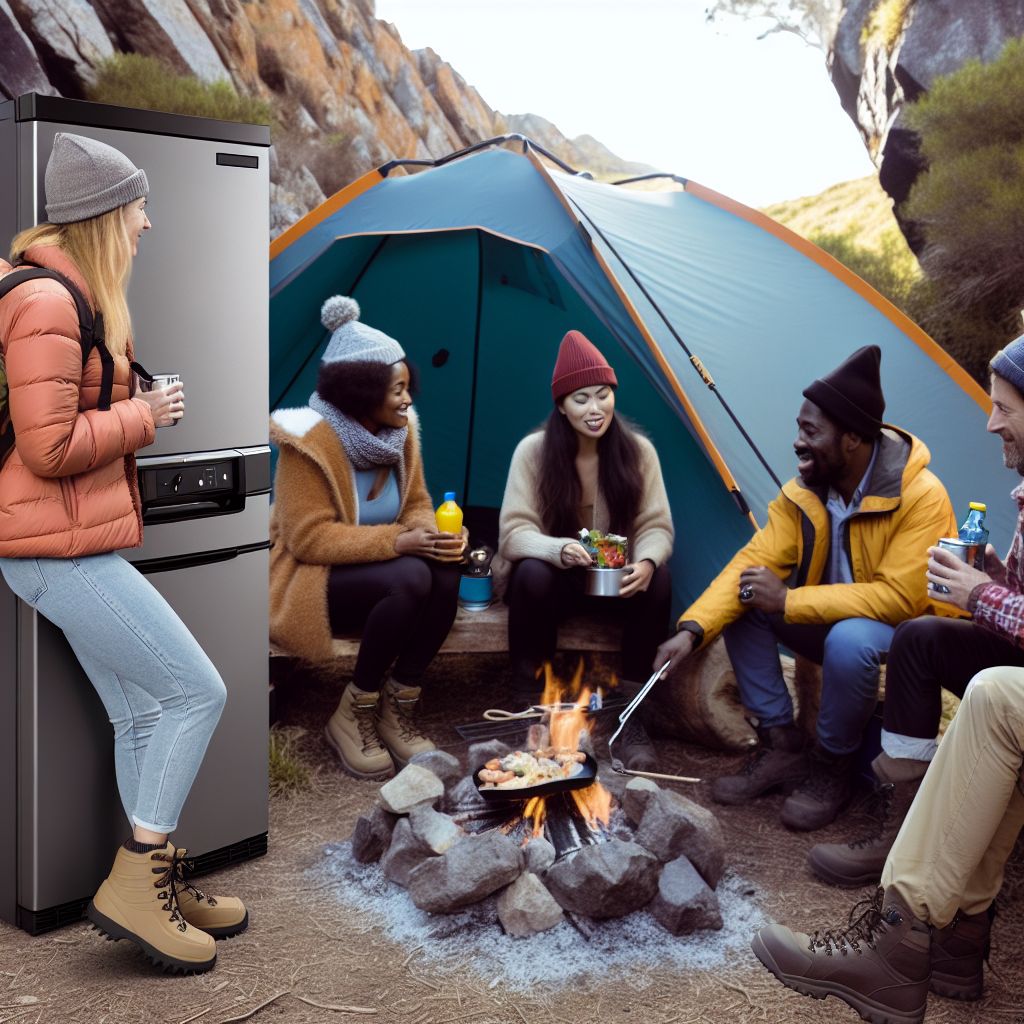Deutsch: Kühlschrank / Español: Refrigerador / Português: Geladeira / Français: Réfrigérateur / Italiano: Frigorifero
A refrigerator is an essential appliance designed to store food and drinks at low temperatures, extending their shelf life and keeping them fresh. In the context of travel, refrigerators take on additional importance and utility, adapting to the specific needs and constraints of mobility and temporary accommodation.
Definitions

Refrigerators used in travel scenarios vary significantly in size, functionality, and power source to accommodate the diverse requirements of travelers. Whether it's for a road trip in an RV, a stay in a hotel room, or camping in the wilderness, travel refrigerators ensure that perishable food remains safe to consume and beverages stay cold.
Travel refrigerators are typically more compact and robust than their household counterparts, designed to withstand the rigors of travel and operate under varying conditions. They can be powered through various means, including standard electrical outlets, vehicle power adapters, or even solar panels, making them versatile for all types of travel.
Application Areas
Application areas for travel refrigerators include:
- Outdoor Camping and Picnics: Portable refrigerators are used to keep food and beverages cold during outdoor activities.
- Road Trips: In vehicles, especially RVs and campers, built-in or portable refrigerators are essential for storing perishables during long journeys.
- Hotel Rooms: Mini-fridges in hotel rooms provide guests with the convenience of storing personal food items and drinks.
- Boating and Marine Use: Special marine refrigerators are designed to operate in a moist, salty environment and often run on 12V or 24V power systems.
- Office or Small Apartments: Compact refrigerators are ideal for spaces where a full-size fridge would be impractical.
Well-known examples
Well-known examples of travel refrigerators include:
- Portable Cooler/Warmer: These small, lightweight units can both cool and heat, making them versatile for travel.
- 12V DC Car Refrigerators: Designed to run off a car's 12V outlet, these refrigerators are perfect for road trips.
- Solar-Powered Refrigerators: For off-grid camping or emergency situations, solar-powered models offer an eco-friendly cooling solution.
Treatment and Risks
Treatment and Risks associated with travel refrigerators primarily concern energy consumption and the need for proper maintenance to ensure efficiency and hygiene. When using a travel refrigerator, it's important to consider:
- Power Consumption: Travel refrigerators should be energy efficient, especially when running from a car battery or solar panel.
- Maintenance: Regular cleaning and airing out are necessary to prevent mold and unpleasant odors.
- Temperature Management: To avoid food spoilage, it's crucial to monitor and maintain the correct internal temperature.
Similar terms
Similar terms include
- portable cooler,
- mini-fridge, and
- electric cooler,
each reflecting different aspects and functionalities within the travel context.
Weblinks
- allerwelt-lexikon.de: 'Kühlschrank' in the allerwelt-lexikon.de (German)
Summary
Refrigerators in the travel context are designed for portability, versatility, and durability to meet the needs of travelers. They come in various forms, including portable coolers, 12V car fridges, and solar-powered units, serving to keep food safe and drinks cold while on the move. The key to their effective use lies in selecting the right type for one's travel needs, understanding their power requirements, and maintaining them properly to ensure food safety and appliance longevity.
--
Related Articles to the term 'Refrigerator' | |
| 'Promotion' | ■■■■■■■■■■ |
| Promotion: In the travel context, a "promotion" refers to a marketing strategy or campaign aimed at attracting . . . Read More | |
| 'Chef' | ■■■■■■■■■■ |
| Chef: A chef is a person who cooks professionally for other people. Traditionally, it refers to a highly . . . Read More | |
| 'Beverage' | ■■■■■■■■■ |
| A 'beverage' refers to any drink or liquid Refreshment that people consume while Traveling or during . . . Read More | |
| 'Terminal' | ■■■■■■■■ |
| Terminal may refer to an Airport terminal or Bus terminal or a Container terminal or a Ferry terminal . . . Read More | |
| 'Blackwater' | ■■■■■■ |
| Blackwater in the travel context refers to various rivers, regions, or towns known for their dark, tannin-rich . . . Read More | |
| 'A la Carte Menu' | ■■■■■■ |
| A la Carte Menu is a food and drink menu in which each item is listed and priced separately. . . . Read More | |
| 'Building' | ■■■■■■ |
| In the travel context, a 'building' refers to a structure that serves a specific purpose and is of architectural . . . Read More | |
| 'Distance' | ■■■■■■ |
| Distance, or farness, is a numerical description of how far apart objects are. In physics or everyday . . . Read More | |
| 'Washington' | ■■■■■■ |
| In the travel context, "Washington" refers to several destinations that are popular among travelers and . . . Read More | |
| 'Columbus' | ■■■■■■ |
| In the travel context, 'Columbus' refers to various destinations, attractions, and landmarks named after . . . Read More | |
